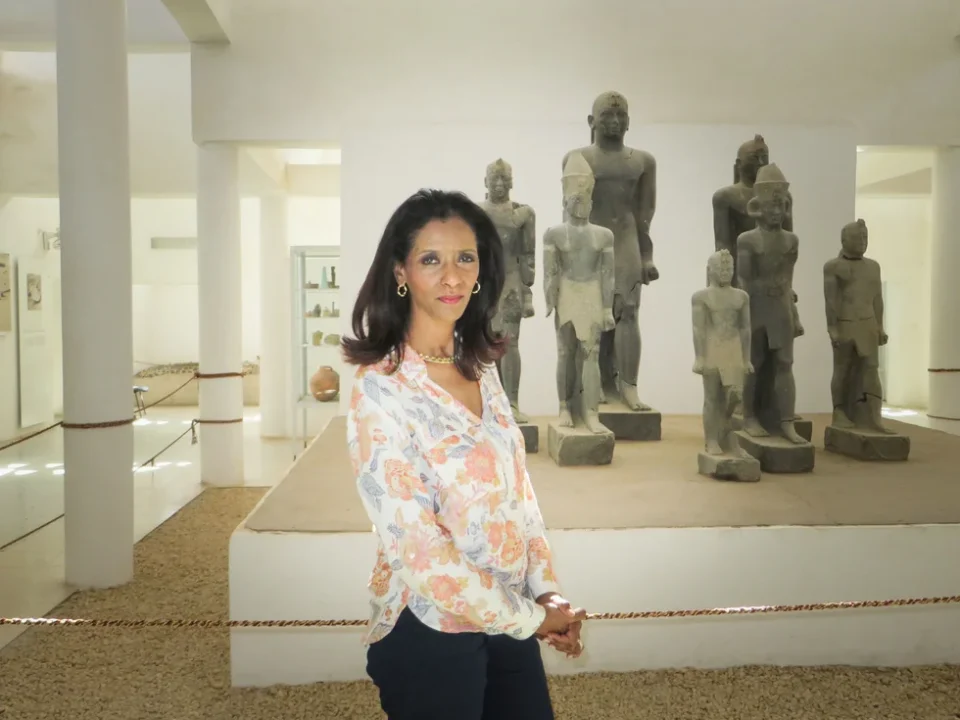
Africa has long been viewed through a European lens that deprives Africans of their rich history, but the book by Zainab Badawi, president of the University of Oriental and African Studies in London, puts the lens in the hands of Africans.
In her new book, “The African History of Africa: From the Dawn of Humanity to Independence,” Badawi says in an interview with the Arab Digest website that the world’s tendency to look at the history of Africa through the Europeans led her to search for the history of Africa through the Africans.
In her book, Badawi devoted 18 chapters, focusing in the first chapters on the point of view of African historians, archaeologists, and cultural experts throughout the continent, north, south, east, west, and center.
The researcher says that she does not accept the division imposed on Africa, that is, the so-called Arab North and sub-Saharan Africa.
When asked about the existence of a deliberate policy to erase African history, Badawi says that the matter was a by-product of Western imperialism, as history is generally considered the history of invaders.
She adds that there is a beautiful saying passed down in South Africa, and she considers it somewhat appropriate: “Until lions find their historians, the history of hunting will always glorify the hunter.”
Viewing African history through the lens of Europeans was a by-product of Western imperialism, as history is generally considered the history of invaders.
Therefore, she believes that history generally tends to glorify the victors, as the Europeans colonized all of Africa (even the Ethiopians, who say they were never colonized, even though the Italians occupied them and also fought many battles with the imperial forces).
She points out that it is for this reason that African history, interpretations, visions and perspectives have been drowned in the narrative of the victors who see history through their own lenses and value systems, and seek to glorify what their generals, soldiers and colonial officers committed.
So you find yourself lacking a history that has been targeted through forgetting or ignoring. This is especially true for those parts of Africa that have not written their history and have always relied on oral traditions to transmit narratives.
This is what made many people think that there was no history in Africa before the Europeans and that they were the ones who wrote what they saw.
It is therefore believed that Africa did not really have any history. But fortunately, the arrival of Islam in Africa was early, which means that there were many Africans who could write in Arabic, as there are large libraries of works of African literature written in this language.
In her question about the story of Al-Mahdi, the Sudanese leader who defeated British General Charles Gordon in Khartoum, and whether it deals with the story from the narrative of the British imperial hero transmitted and offers new insights, Badawi says that the full name of Al-Mahdi is Muhammad Ahmed bin Abdullah, and he is known as Al-Mahdi. He was born in 1844 and died in 1885. He was a religious leader who enjoyed great charisma.
He was born in northern Sudan near Dongola, in the border area with Egypt, and was the son of a boat maker.
He later moved to southern Khartoum. He received a religious education and was a Sufi. He spent years as an ascetic, rejecting material pleasures and living a simple life, devoting himself to worship.
He wanted to be an example to others and amass a large number of followers. He was in his thirties in 1881, and already enjoyed a reputation as a distinguished religious thinker. He attracted many followers from all over Sudan.
The Mahdi faced General Gordon in the Battle of Khartoum in 1885. The Mahdi achieved a victory that resonated throughout Africa, and represented a stunning defeat for this major colonial power.

This was at the same time as the Berlin Conference, from 1884 to 1885, when the European powers began to divide Africa into different spheres of influence. This represented a symbolic victory against the imperialist powers.
This was the subject of a very famous British feature film released in 1966 under the title “Khartoum”. It starred Laurence Olivier as the Mahdi and Charlton Heston as Gordon.
This film achieved great success at the time. He depicted Al-Haqq alongside General Gordon and presented Al-Mahdi as a satanic fanatic.
Arab writer and thinker Edward Said considered the film part of pro-colonial propaganda that pits violent, authoritarian Arab masculinity against a noble and rational Western masculinity. This was a chapter in African history that is sort of still ongoing in the way Edward Said described it.
In asking the researcher of Sudanese origin, what should happen to end the brutal war in Sudan, where the history of Africa, like all other continents, is a history of wars, interspersed with times of peace? Badawi believes that the Sudanese are stuck between a rock and a hard place.
She said that the Sudanese hoped that the appointment of US Special Envoy Tom Perriello would generate some impetus, or even contribute to coordinating the various disparate negotiation tracks.
Badawi believes that an important step is to achieve greater cohesion, coordination and consistency.
The researcher believed that the external players who exacerbated the already bad situation should be held accountable.
It says that players from distant places such as Russia and Ukraine and the division of the Arab world into two opposing sides are prolonging the conflict.
Despite all the conflicts ravaging the African continent, Badawi believes that the future belongs to Africa and its youth
Auther Zainab Badawi, president of the University of Oriental and African Studies in London
alarab-co-uk

